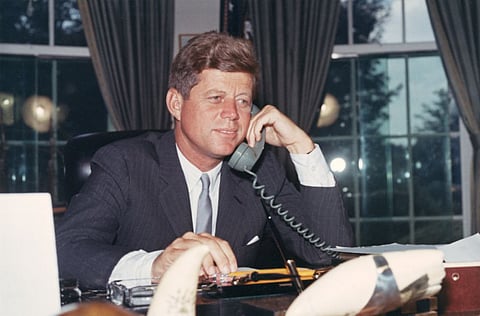JFK could help prevent nuclear war. Can Trump?
The Cuban Missile Crisis five decades ago holds lessons for the US as it faces up the challenge of North Korea today

Fifty-five years ago, on October 20, the then president of the United States, John F. Kennedy (JFK), was navigating the treacherous tides of the Cuban Missile Crisis. Day Four found the young president meeting his joint chiefs and the then defence secretary Robert McNamara to weigh military options against Cuba over the deployment of Soviet nuclear weapons there. Kennedy quickly concluded that any attack against the Soviet ally would paint the US as “trigger happy” in the eyes of our allies and invite a Russian counter-attack, striking West Berlin.
JFK warned his national security team that such an attack “would leave me with only one alternative, which is to fire nuclear weapons”. Because a nuclear response was not acceptable to Kennedy, military plans to strike Cuba were shelved. Five decades later, the US again faces a nuclear showdown, but from another dystopian regime that has committed crimes against humanity to a degree that “does not have any parallel in the contemporary world”.
Those abuses, documented by the United Nations in 2014, targeted North Korean citizens. But it is now US allies in South Korea and Japan facing the fallout from Kim Jong-un’s unstable, Orwellian government.
Like our Asian allies, Americans worry about escalating tensions between Washington and Pyongyang. Seven in 10 respondents told NBC/SurveyMonkey pollsters earlier this month that they fear the country will be embroiled in major war during Donald Trump’s presidency. A majority believe that military conflict will involve North Korea.
Richard Haass, the president of the Council on Foreign Relations, tells me that another Korean war is more likely than most realise. And the chairman of the Senate Foreign Relations Committee, Bob Corker (Republican, from Tennessee), has warned that Trump’s own erratic behaviour could unwittingly pull the US towards Third World War. Sadly, the US commander-in-chief’s words and deeds only confirm the senator’s bleak assessment.
After his military briefing, Kennedy spent the rest of his day carrying on as if the Soviets and Americans were not engaged in nuclear brinkmanship. He left Washington for a scheduled campaign trip to Ohio and Illinois, stumping for candidates in the 1962 mid-term elections. Kennedy offered no indication of the nuclear crisis consuming his White House. That discretion gave administration officials the space they needed to work furiously behind the scenes to defuse the most grave military crisis since the end of the Second World War.
Trump, by contrast, has responded to the current nuclear conflict by publicly threatening to unleash “fire and fury” on North Korea. The president used his speech before the United Nations last month to launch personal attacks against North Korea’s despotic leader. He even undercut his own secretary of state’s attempt at quiet diplomacy, suggesting on Twitter that only a war would resolve the conflict.
In every instance, Trump’s radical rhetoric drew a predictably provocative reaction from a regime that treats its leader as a deity-like figure. Perhaps that is something Trump’s State Department might have warned the president about — if Trump had a functioning State Department. But, of course, he does not.
On Day Five of the Cuban Missile Crisis, Kennedy returned to Washington and feigned sickness so he could spend the day discreetly discussing options for ending the standoff. He would not inform the American people of the ongoing crisis until October 22, 1962, when he told a television audience that “Our goal is not the victory of might, but the vindication of right. Not peace at the expense of freedom, but both peace and freedom ... that goal will be achieved.”
That is the kind of White House address US presidents once delivered. A speech of hope, not hyperbole. A speech that sought peace instead of flirting with war. A speech seeking solutions instead of stirring up the anger of an embittered political base.
But that’s not what we’ve got, or can expect to get, from Trump. What else would Americans expect from a man who once asked a foreign policy adviser why the US had nuclear weapons if they could not use them against countries such as North Korea? Those NBC/SurveyMonkey poll numbers, unfortunately, represent the informed judgement of the people.
Trump voters ignored all the warnings, and most still refuse to entertain second thoughts. Until they do, the rest of the world will have to live with the consequences.
— Washington Post
Joe Scarborough, a former Republican Congressman from Florida, hosts the MSNBC show Morning Joe.


